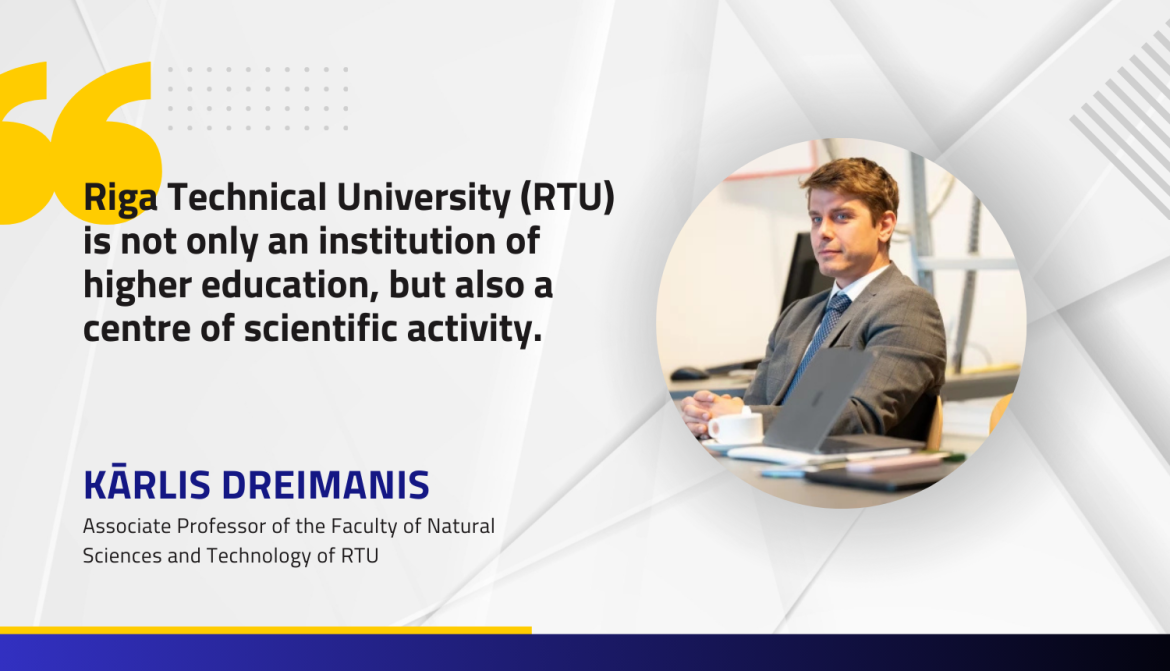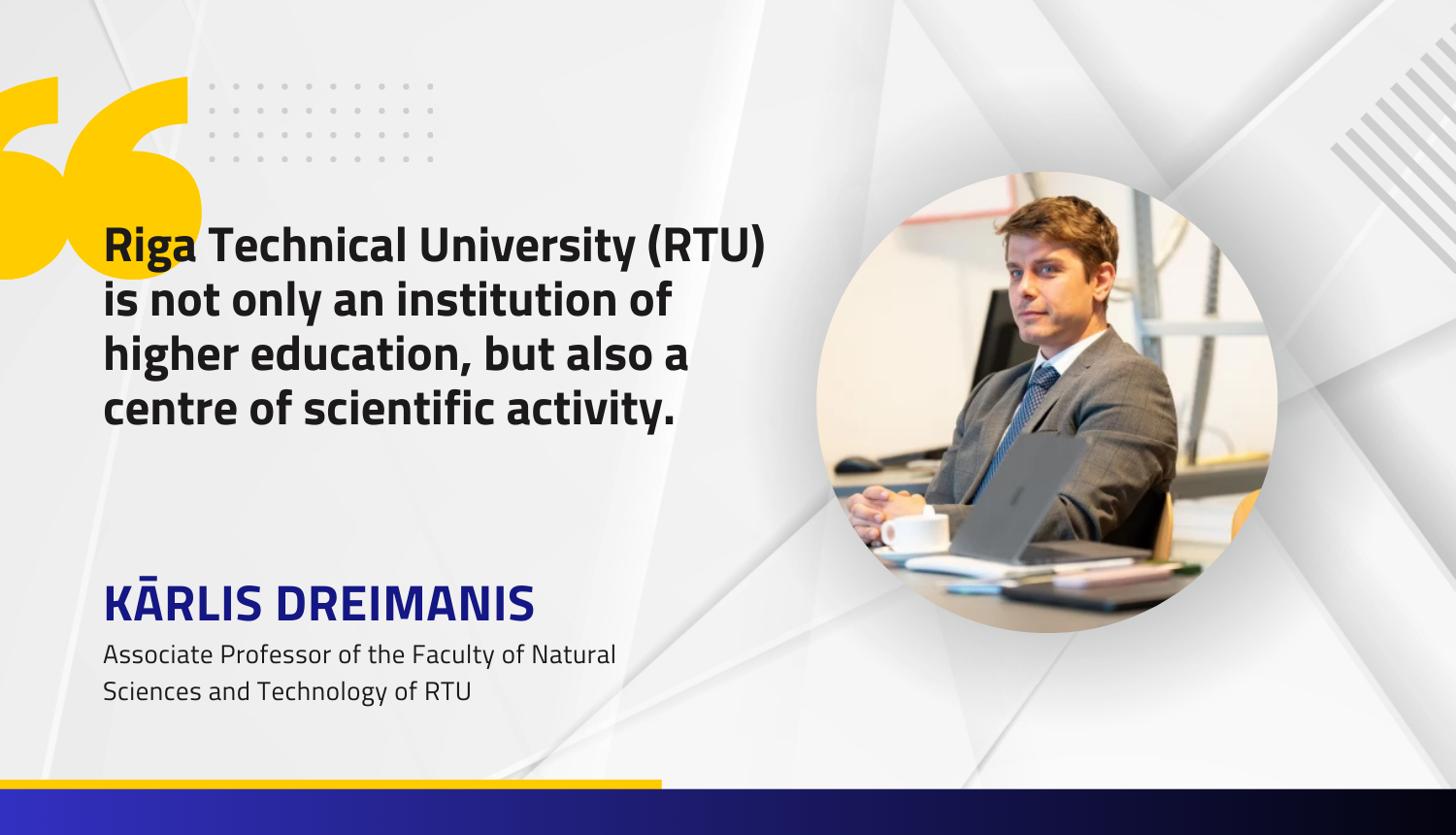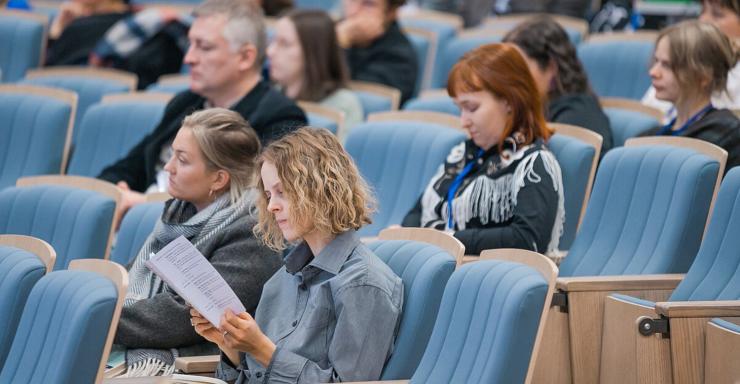If we start with the simplest, it should be recalled that Riga Technical University (RTU) is not only an institution of higher education, but also a centre of scientific activity. And here we come to the tradition of the information environment to talk more about specific discoveries, rather than the work of researchers per se. This, of course, raises questions even among interested audiences about how respected representatives of academic circles come to their discoveries in the first place.

To discuss the anthropological and sociological aspects of science, so to speak, I invited Kārlis Dreimanis, Associate Professor of the Faculty of Natural Sciences and Technology (FST) of RTU, to a conversation. Having received his doctorate from the University of Liverpool, he works at the European Organization for Nuclear Research (CERN), where he leads a group of Latvian scientists in the CERN CMS (The Compact Muon Solenoid) experiment, and is also the Director of the Institute of Particle Physics and Accelerator Technologies at RTU FST.
I think that the public perception of the research process is determined by the feeling that this is not "ordinary work". I think there is an image of the crucial importance of intuition, of a new idea "catching on", as a scientist lost in thought, looking up at the sky or, say, walking along the Zunda Canal in Riga. Does a scientist come to work every day like everyone else?
In order to walk along the Sound Channel, a researcher has to grow up. Figuratively speaking, there could be a few dozen of them in the world. They proclaim their ideas, which others check. Most of us are, as they say, ordinary people who come to work and sit at a computer to work with their "little thing" depending on the specific task. When we put together each of our "little things", if successful, new knowledge arises. The rest depends on the specific field of science. You can, simply put, drop one chemistry on another to understand how they interact, and you can study how elementary particles collide in an accelerator. If we talk about physics analysis at CERN, then we process the data obtained as a result of an experiment. Processing basically means sitting at a computer, coding, systematically analysing and processing statistical data, arriving at a result that colleagues conclude that you have measured correctly. Then this result can be published. This process can take nine months, which is rare, and six years, which is also not common.
I think that part of the public has a visual image in their minds, symbolically speaking, from the time of Niels Bohr, where a physicist is a gentleman or lady in a laboratory full of all sorts of mysterious equipment.
My field is experimental particle physics, and there are both. We have engineers who have to understand where, in simple terms, we need to plug in the wires, there are physicists who take care of the maintenance of the detector, there are physicists who analyse the experimental data, and there are fellow theorists who recommend which direction to look. Each of these stages is necessary, but to summarise what has been said, our work involves both this section of equipment and computers.
I am quite sceptical about the concept of "interdisciplinarity", which has become a kind of buzzword for some time now. Sometimes it feels like it is used to make a project look "modern" and get funding. However, different fields interact. For example, people who are involved in the development of various robots observe how various living organisms move in nature, stick to surfaces, and so on. How does this topic look in the context of your field of work?
I agree that when the term "interdisciplinarity" is used as a buzzword, it can be annoying. On the other hand, from the outside, it may seem that this interdisciplinarity is self-evident - in particle physics, a person must be able to code, analyse data, and understand theory in order for their work to make sense at all. As a physicist, you are unlikely to be the most outstanding specialist in all aspects, but in principle, you need to be able to do different things and keep up with all elements. That's how it looks from the "outside". If you look from the "inside", you understand yourself as a particle physicist, not an "interdisciplinary" researcher. In short, it all depends on the angle you view it from. In principle, your mother's work can also be called "interdisciplinary", because it includes so many different aspects, but it will sound a bit strange, right?
The understanding of research is that the goal is to discover something new. A less noticed aspect is that often the new can be discovered in the past. For example, in science news, you can quite often read about zoologists and botanists who even discover new species or something else useful while rummaging through museum collections. What about physics? A physicist in the third decade of the 21st century rereads, say, Paul Dirac – I'm kidding now – and discovers something new for himself…
In the sociology of science, there is such a concept as the half-life of facts. Over a certain period of time, some of the facts we know turn out to be wrong. This does not always mean that the researcher was wrong. It would be more correct to say that our knowledge of something is now more precise. One could say that this is the case in all branches of science. Physics does have its specifics. If, say, in the case of archaeology, there is a time limit before which so-called primary sources are objectively unavailable, then, if we use the example of Dirac, these sources (interviews, notes, publications) are available to us. Therefore, we are unlikely to find anything fundamentally new. We can potentially, using new knowledge, clarify some interpretations of the symbolic Dirac. And this is happening. There was a time when physicists were racking their brains over how to explain electrostatic phenomena, and then, in the 1860s, James Maxwell formulated his equations, and then they could be used to explain everything related to electromagnetic interactions. It cannot be said that researchers before Maxwell did anything wrong - they simply had a smaller amount of facts at their disposal. The amount of facts increases, and the possibility of better interpretation appears. Or in an even broader context, what we call ancient Greek mathematics was essentially geometry. Algebra appears as early as the ninth century AD in the circle of Arab and Persian culture.
Modern science seems to be characterised by a fairly high degree of specialisation. That's a separate topic, but my question is about what is the level of internal tolerance in the industry? To the public, you are all "physicists" who should be able to comment on everything that the public associates with "physics". In a field that is more understandable to me - history - researchers are not thrilled if a colleague who studies the Middle Ages at all speaks out about, for example, the May 15 coup.
It is clear that people are different, including in terms of such professional tolerance, but it seems to me that a feature of science is openness, then expression is accepted, unless it is somehow personally offensive. I will give an example, deliberately simplifying the explanation. So – there are measurements of the W boson mass. A few years ago, one group of researchers published measurements that did not coincide significantly with the measurements of other groups. The reviewers could not find an error in this work, so it was published. However, the majority of the scientific community believes that there is some kind of error. However, the only thing we can do is to make new and new measurements of the specific parameters. It should be noted that we are doing this in the CMS project and hope to publish the results this year in an internationally recognised publication. Okay, we also think that there is an error in the measurements of this one group, but it can equally well be said that such a situation creates an incentive for research, so different results are not to be ridiculed or denied.
The story of different results fits well with the next question. I am saddened by the fact that science is expected to produce only and only results that we could call positive. If a researcher's work reveals that a hypothesis is wrong, then this work does not count. Although, in my opinion, a negative result is also important.
I agree. As a result of this position, scientists often avoid taking a shot in the dark – trying, and taking risks. Although in biomedicine, a negative result is very important. For example, if a theory allows for the existence of a new particle, I think physicists should try to find this particle, even if other theories do not talk about it, and, most likely, such a particle will not be found. It seems to me that the situation you are asking about is related to the attitude of society. Considering that a large part of society does not understand what researchers are doing, the easiest thing is to demand practical results from researchers. If there are supposedly no such results, then many conclude that it is a waste of money. In turn, decision-makers count on such sentiments. The most sensible solution is for scientists to talk more about themselves, and then society may become more knowledgeable and tolerant.
Taking the content a step further, what do you think about the limits of the world's knowability? Moreover, limitations can be related to human cognitive abilities – well, we are not destined to know and understand something – they can also be technologically determined. Namely, we do not and will not have the tools to discover something.
There are such limits to knowability, and to the ones you mentioned, I would add those that we could call fundamental. Mathematics as a science is characterised by irrefutability. And in mathematics there is the concept of incompleteness. To put it very simply, in mathematics, it is provable that not everything will ever be provable. So, if we cannot prove everything, then this means that we will never know everything. One could argue that mathematics is the most abstract of the sciences, but I think that in physics, we will never know everything either. We can strive to obtain the most complete knowledge possible. If we look at my field of physics, there is an example where both fundamental and, as you phrased it, technological limits appear. We smash electrons together, create energy density in a small dot, but to obtain the energy density that was in the Big Bang, we have to put all the energy of the universe into a dot, which is fundamentally and technologically impossible.


